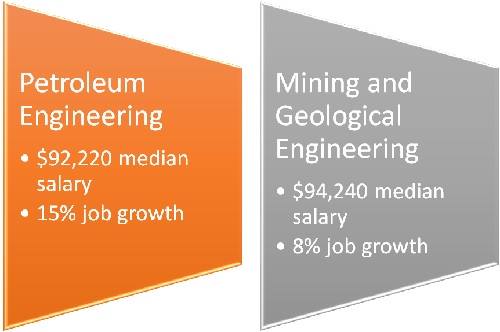Not all engineers work in a laboratory or in an office all day. Two engineering roles that involve a great deal of onsite and often outdoors work are petroleum engineering and mining and geological engineering. These two occupations both focus on the process of retrieving natural resources from within the earth. Petroleum engineers focus on procuring oil and gas for fuel, while mining and geological engineers aid in digging up minerals and coal. There are many benefits to earning both of these degrees. Among the biggest advantages of choosing petroleum engineering over mining and geological engineering are substantially higher wages, higher rates of career growth and more frequent opportunities for world travel.
IMAGE SOURCE: Pixabay, public domain
Higher Income Potential
Both petroleum engineering and mining and geological engineering have higher median wages than the $92,220 overall median salary for all engineering occupations. However, petroleum engineer is the highest paying job in engineering. The pay difference between the two jobs is significant, adding up to tens of thousands of dollars per year. The United States Bureau of Labor Statistics (BLS) reported that petroleum engineers earn a median wage of $132,280. The 13 percent of petroleum engineers working in the management of companies and enterprises industry are the best paid, earning a median wage of $167,950.
For mining and geological engineers, the median salary is $94,240, the BLS reported. As a mining and geological engineer, your industry of employment would play a big part in your earning potential. The best paying industries offer median wages nearly $30,000 higher than that for the occupation as a whole. The 12 percent of mining and geological engineers who work in the oil and gas extraction industry enjoy a median wage of $122,030. The median salary for the nine percent of mining and geological engineers who work in coal mining is just $83,820.
Both occupations have an unusually large wage difference of more than $100,000 between the 10 percent of workers earning the most money and the 10 percent who earn the least, the BLS reported.
Above Average Job Growth
Career opportunities for both petroleum engineers and mining and geological engineers are growing, but petroleum engineering jobs are growing almost twice as fast. The number of petroleum engineers working in the United States will grow by a much faster than average rate of 15 percent over a decade, the BLS reported. With that growth, the 33,700 existing opportunities are expected to increase by another 5,100 jobs.
The job outlook for mining and geological engineers is also positive. With an eight percent growth rate anticipated, the field is growing at the roughly the same rate as all engineering jobs and as overall job growth for all occupations. However, mining and geological engineer is already a very small occupation, with just 7,300 existing workers. The job growth expected will only add another 600 new jobs.
In addition to growing, jobs in mining and geological engineering are also changing. Employers that once hired engineers in-house are increasingly choosing to hire engineering firms for contract work instead, according to the BLS.
Travel Opportunities
Some engineering occupations offer widespread job opportunities. Others require you to do a lot of fieldwork in specific locations. Mining and geological engineers may have to move to a region near mines, perhaps in far-flung locations, to get a job in their field, and they should expect to visit the worksite fairly frequently. Then there are some engineering occupations that require frequent travel even after relocating. Petroleum engineers may take numerous visits offshore oil rigs. Those who work for global oil and gas companies may find themselves working overseas on a long-term basis.
If you’re eager to travel the world and experience new climates and cultures, these travel requirements make petroleum engineering an excellent career path to consider. While homebodies might not see this aspect of petroleum engineering as an advantage, aspiring globetrotters will certainly count this factor as a benefit.
Petroleum engineers and mining and geological engineers put in a lot of hours for their high salaries. About 33 percent of petroleum engineers and 40 percent of mining and geological engineers work more than 40 hours per week, the BLS reported.
Additional Resources
What are the Highest Paying Jobs with a Degree in Petroleum Engineering?
What Are the Highest Paying Jobs with a Degree in Mining and Geological Engineering?
What Are the Benefits of Pursuing a Degree in Petroleum Engineering?



